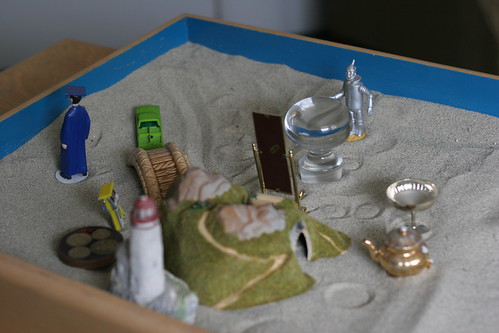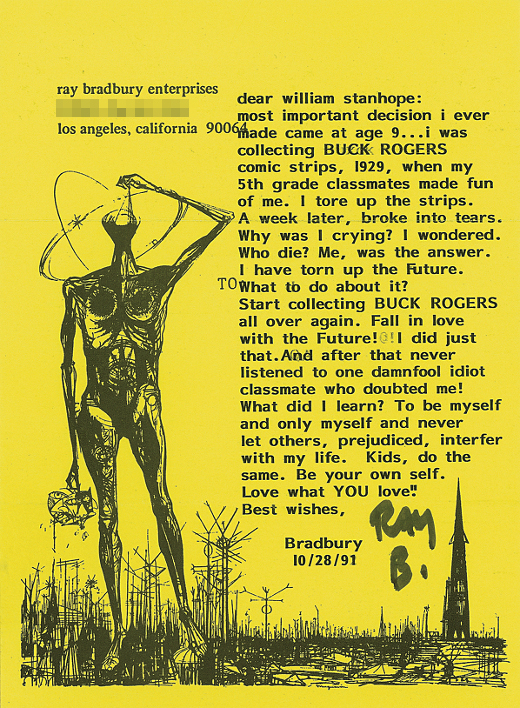I love Bradbury, Asimov, Phillip K. Dick, and many others. I think this, in it's own way, captures the experience that many people I see have. Come feeling like the first part, leaving like the second. :-)
Where behavioral science and humanism get out of the ivory tower, and into the world.
Friday, April 1, 2011
Wednesday, March 2, 2011
Sunday, February 13, 2011
Watching theory of mind develop over checkers
I spent time with my nephew over the weekend, he's 5 and we just, as of yesterday, taught him how to play checkers.
It was extremely interesting from a psych/cognitive developmental point of view. You could watch him learn a rule, try and apply the rule all the time, and learn its limits. He also practiced taking turns and figure ground discrimination, but that was just the regular stuff.
I got to witness him talking out some of his first experiences with more advanced theory of mind. Theory of mind is the idea that your thoughts are yours alone, and that other people have their own cognitions. Kids take some time to figure this out. That's why really little kids don't tell you that they know where your keys were the whole time. Because they know, they assume you know, and vice versa. It takes some time to figure this isn't the case. The most overt sign of this taking hold is when kids learn to lie. They figure out that they can try and tell you a false hood, and have a chance of not getting caught.
My Nephew started phase two of this recently, modeling other people's thoughts and using them to plan. This is a huge step and is what makes playing games possible. Every time you play checkers, chess, backgammon, poker, etc. You need to take the information in front of you, make your plan, then create a mental model of what your opponent will do, then modify your plan to take this into account.
He did really well for his first few games of checkers; he ended up being able to predict what would happen about a move ahead of time. 2, and 3 moves is still beyond his grasp but he's on the road.
It's great to see, because this is also a huge factor in developing good relationships. You need to be able to accurately predict what they other person will do in response to what you say or do to/near/with them. Accurate predictions tend to show better functioning which is usually quite nice :-) . It's always great to see people develop themselves, and I gotta say, I take a whole lot of extra pride in seeing my little nephew do it too :-D
Labels:
Checkers,
games,
modeling,
planning,
relationships,
theory of mind
Tuesday, December 7, 2010
Mixing modalities
 | |||||
| From the Flikr Stream of Emily Hoyer |
The set up is pretty simple, you have a container roughly the size of a storage bin filled 1/2-3/4 with sand, and a host of miniatures and a mental health professional. From there you essentially let people do what they want. Some people just push the sand around, others make simple, static scenes. Others make highly elaborate dynamic stories that fill, or even overflow from the container. What usually gets created is the person's head space in some way, shape or form.
It's a very different way to engage with one's mind. Because it's so mailable, and those hard to articulate thoughts can be represented in the tray without words, a whole new way of working with one's inner life is possible. It's accessible for children and adults, average functioning people, those with disabilities and everyone in between.
I'm really smitten with it :-) . Everyone's welcome to come and try it out!
Thursday, October 14, 2010
Woo! Inflammatory article time!
So Mr. James Oliver at the Guardian has written an article on how current (lack of) genetic evidence for mental illness in populations is strong evidence that much of it is socially constructed, and there for, conservatives are dumb. Ie. Psychological challenges are much more prevalent in people who have a low socio-economic-status as opposed to those who enjoy a high SES regardless of genetic tendencies.
He goes on to talk about how, from a genetic perspective, south east Asia should have the highest rates of depression. While from psych testing it shows to have some of the lowest rates. He goes on to state that this is because they are much more collective society but he doesn’t site any peer-reviewed evidence to support this. Then he goes on to talk about how conservatives are echoing ideas of “Social Darwinism” in the belief that the genetic sciences would back them up.
While I believe that SES, culture, and environment and quality of learned coping and interaction skills are probably the most important factors in mental health I’m reluctant to take the leap Mr. Oliver did. Correlation / causation are dangerous ideas to conflate, and the ad hominem attacks with it speak to me of major editorializing. Which strikes as a problem when presented in an article that is originally set up to be a fact based one.
But still… more and more to think about…
Labels:
depression,
genetics,
poverty,
ses,
social darwinism
Monday, October 11, 2010
It gets better
http://www.itgetsbetterproject.com/
I know I’m a few weeks behind the cutting edge, but I think for everyone who’s not familiar yet with Dan Savages amazing new support idea “It gets better” campaign I thought I’d fill ya in. The main focus is help prevent suicide among teens who identify as part of the LGBTQ community. Many LGBTQ teens commit suicide due to bulling and many other hardships they face as a teen out side the norm. People who identify as LGBTQ, particularly teens, are much much much more likely to use alcohol, other substances, harm themselves and kill themselves.
The youtube channel that he made is filled with videos of adults speaking about their teen years and many of the hardships they faced and that, in fact, life gets better. The bullying ends, they can move to better places, find friends, love and have futures. In hopes that it’ll give strength and solace to LGBTQ youth to make it through. It’s an extremely powerful set of videos and I recommend everyone watch it. Even if you’re not a youth questioning your sexual identity, or knowing that you’re a sexual minority you should watch it, and pass it along to anyone you know who could use some encouragement in life.
http://www.itgetsbetterproject.com/
Sunday, October 3, 2010
New MHCA site!
Hi all!
I just completed and set up the new website for the Hudson Valley chapter of the New York Mental Health Counselors Association. Check it out! http://hudsonvalleynymhca.com
I just completed and set up the new website for the Hudson Valley chapter of the New York Mental Health Counselors Association. Check it out! http://hudsonvalleynymhca.com
Subscribe to:
Posts (Atom)
